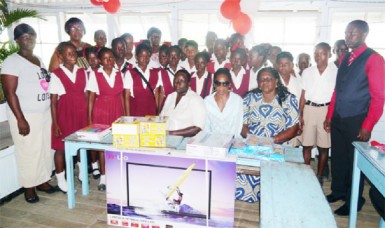A programme to assist students with learning difficulties has been launched at the No. 29 Primary School in West Berbice through the initiative of a former student Sherwin Fraser.
The historic Literacy and Numeracy Intervention Programme is being partially funded by the Australian government through the Trafalgar/Union Community Development Committee (CDC).
At the launch on June 25, Fraser, the project coordinator, said the programme was conceptualised nine months prior based on test scores for the target group, which shows that a large number of students have learning disorders, such as dyslexia, dysgraphia and dyscalculia.

“There is no shame in having a learning difficulty. The shame is knowing that there is a problem and not providing the help…,” Fraser noted.
Eight teachers from the school would be trained to administer the programme to the children through current literacy and numeracy techniques and strategies.
The programme also seeks to assist teachers and parents in overcoming the challenges faced in working with children who have learning difficulties.
In his address at the launch, Fraser said the programme, which is “the first of its kind in Guyana, will be utilising the three-tier model of whole school approach to intervention, which has been adapted from the education system in Queensland Australia.”
The model, he said, “Will see the use of explicit teaching in response to achievement data, targeted teaching as well as intensive and collaborative teaching in critical areas such as reading, writing and math.”
In addition, he said, students’ critical thinking skills, communication skills, self- awareness, social interaction skills, cognitive and meta-cognitive skills as well as coping and resiliency skills will also be developed.
Fraser, who is also a recent Australian scholar, said monitoring and evaluating would be done daily and students’ progress will be evaluated the end of each week.
According to him, “The lasting developmental effect will see students’ improvement and enhance performance…” in the specific areas.
“In turn, this will also help to mitigate a number of issues relating to underachievement in our schools and society as a whole,” he said.
Since this programme is evidence-based the data collected will help to plan for future programmes and possibly the replication to other parts of the country.
He hoped that the issue of underachievement particularly among boys will be tackled from a national level. “I will be more than happy to be part of a research team investigating this issue,” he said.
Headmistress Claudette Fraser and teacher Kamlawattie Ramdeo also spoke at the launching and thanked Fraser for bringing the programme to No. 29 Primary.
Also making brief remarks was director of the Trafalgar/Union CDC Lloyda Nichols, while Michael Small, finalist in the GT&T Jingle and Song competition, performed for the audience.





